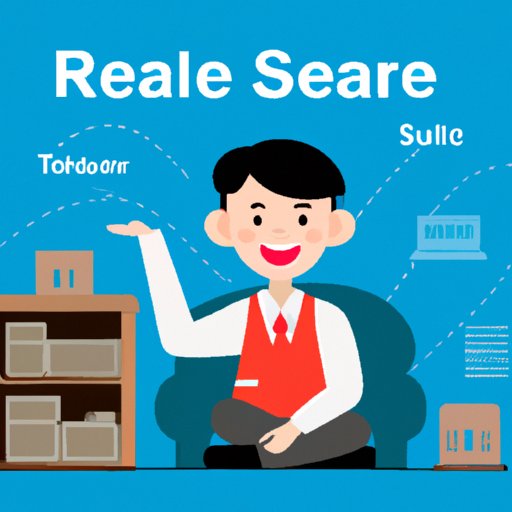Introduction
Do you have a passion for buying and selling items? Starting your own resale business could be a great way to turn your hobby into a profitable business. But how do you get started? This article will walk you through the steps of starting your own resale business, from researching the industry to finding inventory to setting up shop and promoting your business.
What is a Resale Business?
A resale business is a type of retail business that specializes in buying and reselling items. These items can range from clothing and accessories to electronics and furniture. Resale businesses typically purchase goods from wholesalers or directly from customers, then resell them at a markup. The goal of a resale business is to make a profit by selling items at a higher price than what was originally paid for them.

Benefits of Starting Your Own Resale Business
Starting your own resale business has many benefits, including:
- Low startup costs – Depending on the type of resale business you decide to start, you may not need to invest much money upfront.
- Flexible hours – You can choose when and how often you want to work.
- Opportunity to make a profit – By buying and reselling items, you can make a profit off of each sale.
- Ability to work from home – Many resale businesses can be run entirely from home.
Research the Resale Industry
Before you begin setting up your resale business, it’s important to conduct some research. This will help you understand the current trends in the industry and identify items that are selling well. Here are some tips for researching the resale industry:
Understand Current Trends in the Industry
It’s important to stay up to date on the latest trends in the resale industry. Popular items come and go quickly, so it’s important to know what’s currently popular and what’s not. You can stay up to date on the latest trends by reading industry blogs, attending trade shows, and talking to other resale business owners.
Identify Items That Are Selling Well
Once you’ve identified the current trends in the industry, you can begin to identify items that are selling well. You can use online marketplaces like eBay and Amazon to see what items are selling and for how much. You can also use search engines to find out what people are looking for and what items are in high demand.
Develop a Business Plan
Once you’ve done your research, it’s time to develop a business plan for your resale business. A business plan is a document that outlines your goals, strategies, and finances. It’s important to create a detailed business plan before launching your business, as this will help you stay organized and focused.
Determine Your Budget
The first step in creating a business plan is determining your budget. How much money do you have to invest in your business? What are your expected expenses? Knowing your budget will help you determine how much inventory you can purchase and how much you can spend on advertising and marketing.
Identify Your Target Market
Once you’ve determined your budget, you can begin to identify your target market. Who are you trying to reach with your resale business? Are you targeting a particular demographic or age group? Knowing who you’re targeting will help you tailor your marketing efforts and ensure that you’re reaching the right people.
Establish a Pricing Strategy
It’s also important to establish a pricing strategy for your resale business. How will you price your items? Will you offer discounts or bundle items together? Establishing a pricing strategy will help you maximize your profits and ensure that you’re competitive in the marketplace.
Find a Source for Inventory
Now that you’ve created a business plan, it’s time to find a source for inventory. You’ll need to select reliable suppliers or vendors who can provide quality items at a reasonable price. Here are some tips for finding a source for inventory:
Select Reliable Suppliers or Vendors
When selecting suppliers or vendors, it’s important to choose ones that are reliable and trustworthy. Take the time to research potential suppliers and read reviews to ensure they’re reliable. You should also ask for references and check to make sure they’re offering fair prices.
Ensure Quality of Items
It’s also important to ensure the quality of the items you’re purchasing. Make sure to inspect each item before you purchase it to ensure it’s in good condition. You don’t want to end up with a bunch of damaged or defective items that you can’t resell.
Choose an Online Platform
In order to reach more customers and increase your sales, you’ll need to choose an online platform for your business. There are a variety of options available, such as websites, social media accounts, and online marketplaces. Here are some tips for choosing an online platform:
Consider Using a Website and/or Social Media Accounts
Creating a website and/or social media accounts for your business is a great way to reach more customers. Websites allow you to showcase your products and tell your story, while social media accounts enable you to engage with customers and build relationships. Both can be powerful tools for promoting your business.
Set Up Payment Processing
Once you’ve chosen an online platform, you’ll need to set up payment processing. There are a variety of payment processing services available, such as PayPal and Stripe. These services enable customers to pay for their purchases securely and conveniently.
Set Up Shop
Now that you’ve found a source for inventory and chosen an online platform, it’s time to set up shop. This involves designing your store, creating product descriptions, and organizing your inventory. Here are some tips for setting up shop:
Design Your Store
When designing your store, think about the layout and look you want to achieve. Consider adding visuals such as photos and videos to make your store more engaging. You should also consider using an ecommerce platform to make it easier to manage your store.
Create Product Descriptions
Product descriptions are essential for any ecommerce store. Make sure to include detailed descriptions of each item so customers can easily understand what they’re buying. You should also include relevant keywords to help customers find your products.
Promote Your Business
Once you’ve set up shop, it’s time to start promoting your business. There are a variety of strategies you can use to reach more customers and increase your sales, such as SEO, advertising, and social media marketing. Here are some tips for promoting your business:
Use SEO and Advertising Strategies
SEO and advertising are two powerful strategies for promoting your business. SEO helps customers find your business through search engines, while advertising allows you to reach a wider audience. Make sure to use relevant keywords and create compelling ads to capture the attention of potential customers.
Utilize Other Marketing Strategies
In addition to SEO and advertising, there are a variety of other marketing strategies you can use to promote your business. Consider offering discounts, running contests, and utilizing influencers to spread the word about your business. You can also engage with customers on social media to build relationships and loyalty.
Monitor Performance
As you continue to promote your business, it’s important to monitor its performance. Track sales, customer feedback, and other metrics to evaluate the success of your business. You can also use analytics tools to gain insights into customer behavior and uncover opportunities for improvement.
Track Sales, Customer Feedback, and Other Metrics
Tracking sales and customer feedback can give you valuable insights into the performance of your business. Additionally, tracking other metrics such as website traffic, conversion rates, and average order value can help you identify areas of opportunity and optimize your strategies.
Evaluate the Success of Your Business
Finally, take the time to evaluate the success of your business. Are you meeting your goals? Are you generating enough revenue? Use the data you’ve collected to assess the performance of your business and make adjustments as needed.
Conclusion
Starting your own resale business can be a great way to make a profit and pursue your passion. By following the steps outlined in this article, you’ll be well on your way to getting your business off the ground.
(Note: Is this article not meeting your expectations? Do you have knowledge or insights to share? Unlock new opportunities and expand your reach by joining our authors team. Click Registration to join us and share your expertise with our readers.)
